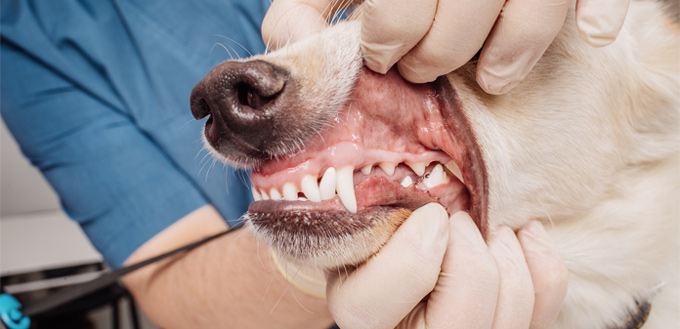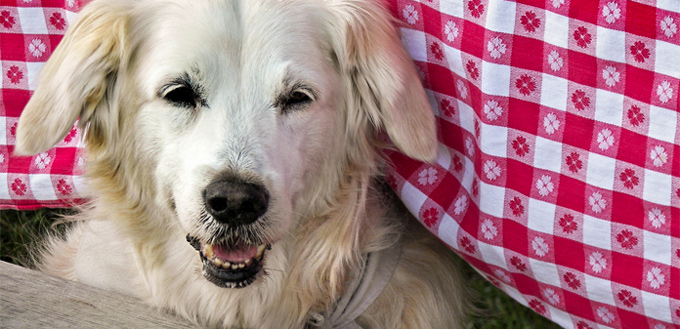Dogs exhibit much strange behavior. Though it may look weird to us, in reality, these behaviors are significant as they depict some underlying problems.
One such behavior is dog chattering. You can see this behavior among almost all dog breeds. So, let’s understand what is the cause for it and what you can do to make it better for your dog.

Causes of Dog Teeth Chattering
Most of the time, the reasons for your dog’s teeth chattering is temporary and have no long-term consequences for the dog.
In general, it can chatter due to the following reasons.
- Low body temperatures
Have you ever found your teeth chattering in the cold or when you’re running a fever and have shivering associated with it? Well, the dog has the same behavior too. In fact, all mammals shiver when they are cold. This is a natural body mechanism to bring warmth to the body by causing the muscles to twitch, so they have friction and in turn, this can generate heat. The movements of muscle in the neck and jaw area cause teeth chattering.
- Excitement
When your dog is excited or is looking forward to something that it loves, it can chatter its teeth. This behavior, however, varies among dogs. It just depends on the dog’s personality and how it exhibits its emotions. This is also a temporary behavior that will subside when the dog loses its excitement or when its anticipation is fulfilled.
- Fear and anxiety
Just like excitement, some dogs will chatter their teeth in fear or anxiety too. For example, when your dog’s teeth chatter just when you leave for work, the dog is anxious and this is how it exhibits it. Like the previous scenarios, this chattering is also temporary.
But however, it is important you read the pattern, so you can fix the fear or anxiety that causes this behavior. When the dog chatters its teeth too often, the friction can cause the teeth to fall. So, it is important to stay on top of this behavior for both the dental and emotional health of your dog.
- Social interactions
Some dogs exhibit teeth chattering when they are trying to socialize with other dogs. This behavior, can again, be due to fear or anxiety as your dog could feel threatened by other dogs. Alternately, it could also be an expression of excitement to meet other dogs. The context depends on your dog’s personality.
If your dog is excited, this chattering will mostly subside after your dog has met with the other dogs and will tend to start playing with them right away. If the chattering increases or persists for sometime after the dog meets other dogs, it could indicate fear.
Look for other symptoms too. If your dog doesn’t look too stressed, you can allow the dog to take its own time to stop the chattering. On the other hand, if you see symptoms of stress, intervene right away and take appropriate action.
- Genetic
Detection and recognition of odor is an important trait in every dog, and is in fact, a way of its life too. Though nose is the primary mode of scent recognition, dogs can also sense odor through the vomeronasal organ that is located inside its mouth.
Many times, the dogs will move their teeth and mouth to bring the smell of scent towards this organ, and one such behavior is teeth chattering. But, there is one prominent difference you can notice. This type of chattering tends to be slower and less frequent when compared to chattering due to other factors. Also, it tends to be more common in male dogs than females.
- Dental problems
Not all teeth chatter are harmless. Dogs will chatter their teeth if they have dental problems, infections in the teeth’ cavities or if any of their teeth are broken.
If you notice your dog eating lesser than usual or chewing in an odd way, it could indicate some dental problems that require a trip to the vet. It is best you take your pet as soon as you see these symptoms, as any delay can make it more difficult and can reduce your dog’s quality of life.
- Epilepsy
If your dog is suffering from serious health conditions like epilepsy, the teeth chattering will be accompanied by jaw clenching. Also, this will happen frequently and there will be a definite pattern to it.
That said, epilepsy is fairly rare among dogs.
- Shaker syndrome
Another cause of teeth chatter is shaker syndrome, a condition in which the entire body tremors because of damage to the dog’s neurons. This syndrome requires the intervention of the vet.

Some breeds such as Maltese and West Highland white terriers are genetically more predisposed to shaker syndrome than other breeds. So, if you have these breeds, watch out for the symptoms. The entire body will shake along with the teeth, and when this happens, address the problem at the earliest.
- Old age
Just like humans, old age brings many health changes in dogs too. They use different ways to cope with these changes and one of them is teeth chattering. In fact, research shows that teeth chattering is more common in older dogs than pups.
It is still a good idea to check with the vet to rule out any serious underlying condition.
Regardless of the reason, it is a good idea to bring up this habit of teeth chattering with the vet during the next routine visit, so the vet will check for other symptoms. Sometimes, your vet may not be able to identify the cause of teeth chattering because some seizures and conditions are hard to identify and treat.
The ground rule is, if the teeth chattering does not have a profound impact on your dog, it is fine. Also, make sure that it does not signify any health or emotional issues. One way to rule out this possibility is to look for other symptoms and patterns that cause this behavior. Reach out to your vet, in case of any concerns.
Sources:
- Helen Anne Travis, Dogs and Teeth Chattering: What You Need to Know, PetMD
- Jaw Chattering in Dogs, Wag
Note: The advice provided in this post is intended for informational purposes and does not constitute medical advice regarding pets. For an accurate diagnosis of your pet's condition, please make an appointment with your vet.






